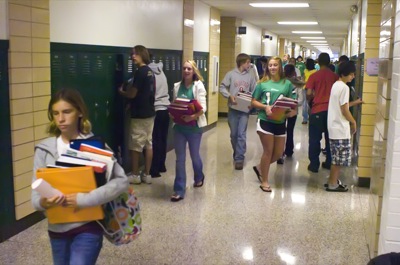Friday, October 1st, 2010
Response to Celina trimester mostly positive
By William Kincaid

Photo by Mark Pummell/The Daily Standard
Students navigate the halls this morning at Celina High School. Both students and teachers are adjusting to a switch to trimesters this school year.
CELINA - Mackenzi Rutschilling said she and her friends had reservations about entering their senior year at Celina High School with the new schedule system.
But Rutschilling said she mostly likes the switch from the traditional nine-period, quarter system - used for the last 10 years - to the new, five-period, trimester schedule.
She enjoys only having five classes.
"You get your stuff done," Rutschilling said. "At home, you don't have as many subjects."
She also likes having the extra time - classes are now 65 minutes, 23 more than last year - in some of her courses.
"It helps in science class because we have labs," she said, explaining that the lab can be completed in one day instead of two and she doesn't forget anything.
Other students interviewed by the newspaper Thursday afternoon were supportive of the trimester. But some, depending on their class schedule, pointed out drawbacks and inconveniences.
Senior Shelly Dorsten likes the reduced class load, but misses having a study hall.
"At first I was a little iffy," she said about the trimester.
Study hall has been replaced with a 30 minute advisory period used for announcements and other items, leaving them little time to do homework, students said.
Brady Bader, who initially worried the trimester would ruin his senior year, said most teachers are good with giving him enough time in class to work on homework.
"It makes your day go by so much faster," he said about the trimester.
But a few students said some of their AP courses that were taught in back-to-back classes last year - what they called a double-period - are now taught in a single class, actually reducing the total time from 85 to 65 minutes, forcing the teacher to work faster.
Junior Leslie Gudorf said she is taking the first part of pre-calculus the first trimester and the second part of pre-calculus the third trimester, adding that she is concerned about the 12 week intermission in-between because she could forget something.
Students interviewed favor the change overall, stating they are learning more during the longer periods and they like the opportunity to enroll in courses previously not available, such as creative writing, gothic/horror fiction and successful speaking.
"You have more variety," Gudorf said.
High School Principal Jason Luebke - who successfully lobbied board of education members to make the switch to trimesters - said it's important that teachers embrace the change and provide three different activities or teaching styles each period to sustain the students' attention.
"They've taken a hold of it - they've done a wonderful job," Luebke said of his staff. "The idea is you change the activity every 20 to 30 minutes and I've been seeing that."
Luebke said he believes dividing some classes, such as pre-calculus, is a positive because it increases the possibility that students will have different teachers for the same subject, exposing them to various experiences and styles - something they'll see if they go to college.
The teachers' biggest concern is finding time for students who missed a day of class to makeup tests and other work, Luebke said.
"We're trying to find a good way to do that," he said, pointing out some of the work can be completed during the advisory period, class or after school.
Because of that inconvenience, as well as the large amount of information taught in the longer classes, Luebke said he expects attendance to improve.
He said the advisory period is also a good change because it allows students to attend organizational meetings or assemblies without using class time.
The ultimate goal of the trimester to facilitate a deeper understanding of the subjects, and hopefully increase the numbers of students at the post-secondary education level, Luebke said.
"I think we've all been pleasantly surprised," he said about the transition to trimesters.
Students are more focused on academics because they are honing in on fewer classes, he said.
"It cuts down on discipline problems," he said.




